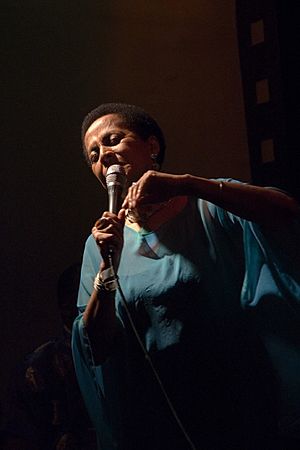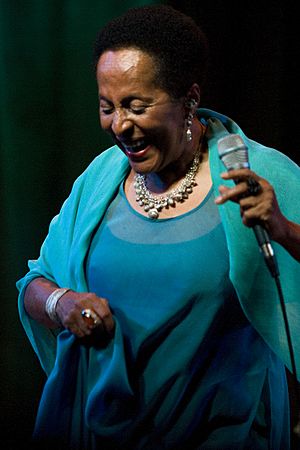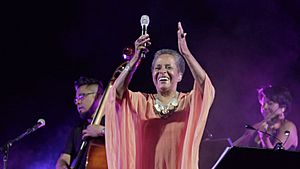Susana Baca facts for kids
Quick facts for kids
Susana Baca
|
|
|---|---|

Baca in Santa Cruz, 17 April 2010
|
|
| 2nd Minister of Culture | |
| In office 28 July 2011 – 10 December 2011 |
|
| President | Ollanta Humala |
| Preceded by | Juan Ossio Acuña |
| Succeeded by | Luis Peirano Falconí |
| Personal details | |
| Born | 24 May 1944 Chorrillos, Lima Province, Peru |
| Occupation | Singer-singer, songwriter, educator and politician |
Susana Esther Baca de la Colina, born on May 24, 1944, is a famous Peruvian singer, songwriter, and teacher. She has won three Latin Grammy Awards. Susana Baca is very important for bringing back and popularizing Afro-Peruvian music.
In July 2011, she became Peru's Minister of Culture. This made her the second Afro-Peruvian person to hold a cabinet position in Peru's history. In November 2011, she was also chosen to lead the Culture Commission for the Organization of American States (OAS) from 2011 to 2013.
Contents
Susana Baca's Music Journey
Susana Baca grew up in Chorrillos, a fishing village near Lima, Peru. Her music mixes old and new styles. Her band uses special Peruvian instruments. These include the cajón (a wooden box drum) and the quijada (a donkey jawbone). They also use acoustic guitars and electric basses.
Many of her songs are based on traditional Peruvian music forms. These include the landó and vals. She also adds sounds from Cuba and Brazil. Her first album with the Luaka Bop label helped her become known worldwide.
Bringing Back Afro-Peruvian Music
Susana Baca has played a huge role in making Afro-Peruvian music popular again in Peru. This type of music and culture was not well-known before. Now, it is seen as a very important part of Peruvian culture.
Baca helped make this music famous around the world. This started in 1995 with an album called Afro-Peruvian Classics: The Soul of Black Peru. This album featured her song "Maria Lando". It was released by a record label owned by David Byrne, who was in the band Talking Heads.
What Critics Say About Her Music
Many important music critics think Susana Baca is more than just a great singer. Michael Heumann from Stylus Magazine said that "Maria Lando" made her famous. He added that her albums are always "incredibly high quality."
Timothy G. Merello from PopMatters described her as a "poet, a historian, a spelunker and explorer of Afro-Peruvian folklore and music." He said she and her band "entertain, educate and entrance" audiences. Deanne Sole, also from PopMatters, praised Baca's 2009 album Seis Poemas. She called it "a small album but a charming one."
Susana Baca also started the Instituto Negrocontinuo. This institute is in her home in Chorrillos. Its goal is to collect, save, and create Afro-Peruvian culture, music, and dance.
Awards and Achievements
Susana Baca has won several important awards for her music.
- In 2001, her album Canto was nominated for a Grammy Award.
- In 2002, she won a Latin Grammy Award for Best Folk Album for her album Lamento Negro.
- In November 2011, she won her second Latin Grammy. This was for her song "Latinoamérica" with the group Calle 13. Brazilian singer Maria Rita and Colombian artist Totó la Momposina also sang on this song.
- Her 2020 album A Capella was nominated for Best Folk Album at the 21st Annual Latin Grammy Awards. She won this award and dedicated it to the young people of Peru.
Her Role in Politics
In July 2011, Peru's new president, Ollanta Humala, announced that Susana Baca would be his Minister of Culture. She officially started on July 28, 2011. She was the second Afro-Peruvian person to become a cabinet minister in Peru's history. She left this role on December 11, 2011, due to changes in the government.
In November 2011, she was also chosen to be the President of the Commission of Culture for the Organization of American States (OAS). She held this position from 2011 to 2013.
Music Albums
- 1987 - Poesía y Canto Negro
- 1991 - Vestida de Vida, Canto Negro de las Américas!
- 1992 - Fuego y Agua
- 1997 - Susana Baca
- 2000 - Eco de Sombras
- 2001 - Lamento Negro
- 2002 - Espíritu Vivo
- 2002 - A Viva Voz (a collection of her songs)
- 2004 - The Best of Susana Baca (another collection)
- 2006 - Travesías
- 2009 - Seis Poemas
- 2010 - Mama
- 2010 - Cantos de Adoración
- 2011 - Afrodiaspora
- 2020 - A Capella: Grabado en Casa Durante la Cuarentena
- 2021 - Palabras Urgentes
- 2025 – Conjuros
Songs with Other Artists
- 1996 - The Rough Guide to the Music of the Andes
- 2011 - Sang "Latinoamérica" with Calle 13.
- 2013 - Sang "Gracias a la Vida" with Chucho Avellanet.
- 2016 - Sang "Molino Molero" with Charlie Hunter and "Fuego y Agua" on Family Dinner – Volume 2 by Snarky Puppy.
Films Featuring Susana Baca
- 2003 - Susana Baca: Memoria Viva. This film was directed by Marc Dixon.
- 2013 - Sigo Siendo. Directed by Javier Corcuera.
- 2011 - Música afroperuana: tras la larga noche. This was a documentary for TV.
See also
 In Spanish: Susana Baca para niños
In Spanish: Susana Baca para niños
 | John T. Biggers |
 | Thomas Blackshear |
 | Mark Bradford |
 | Beverly Buchanan |



